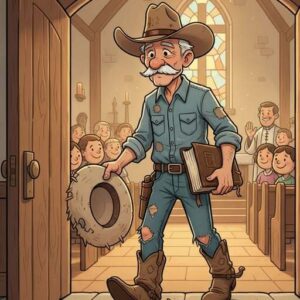I was at a classmate’s home. Both her mom and dad looked pale and gaunt, with dark circles under their eyes and veiny arms. As we sat down to eat, I finally realized why they looked so scary. In a huge bowl, I was served plain, cold beans with a slice of white bread soaked through like it had been sitting in water.
Her name was Maela. We’d only talked a few times at school, but she was sweet in a quiet way. I didn’t have many close friends, and she’d invited me over with this sort of desperate excitement that I mistook for friendliness. Now I realize she probably just needed someone to witness her life.
Her house was oddly spotless. Not in a fancy, polished way—more like nobody actually used anything. Everything was there but lifeless. Her little brother, maybe six, sat silently on the living room carpet pushing around a toy truck with a cracked wheel. No cartoons, no sound. Just that wheel scraping.
At the table, her mom gave me a tight smile. Her dad didn’t even look up. He just scooped more beans into his bowl with this mechanical motion, like it was a job. I took a bite, trying not to show anything, but the beans were cold straight from the can. I mean fridge-cold. And the bread… soggy to the point of falling apart in my hand.
My stomach twisted. Not from disgust, really—from something deeper. Like shame, maybe. Or guilt. I didn’t say a word. Maela was eating like it was normal.
After dinner, we sat in her room. She didn’t talk much, just showed me some drawings in an old sketchbook. She had real talent—shading, emotion, even movement in her figures. I told her so. She shrugged. “I used to want to go to art school. I don’t know anymore.”
I excused myself to use the bathroom. The light flickered when I turned it on. While washing my hands, I noticed something on the shelf—rows of pill bottles. At least ten. Some were for anxiety, a few antidepressants, and one I recognized from my grandmother’s cabinet: methadone.
I called my mom from the bathroom, whispered so Maela wouldn’t hear. “Can you come get me? Right now. Please.”
My mom came within ten minutes. I told her I didn’t feel well and we thanked Maela and her parents before leaving. In the car, my mom didn’t say much at first. Then quietly, “You okay?”
“I think her parents are addicts.”
She nodded slowly, like she’d guessed something similar. “And I think Maela’s the one holding that house together.”
I didn’t know what to do with that.
At school the next week, Maela avoided me. Or maybe I avoided her. I felt guilty for leaving so fast. But also a little scared. Not of her, but of what I didn’t know how to help with.
A few weeks passed. Then one day, a teacher asked me to come see her during lunch. I was sure I was in trouble. But instead, she closed the door and said, “You’re friends with Maela, right?”
“I guess?”
“She put your name down as a reference for a youth mentorship scholarship. She didn’t have anyone else.”
That cracked something in me. I didn’t know there were scholarships for that. But apparently it was for kids going through “unusual home circumstances,” and they needed a peer to vouch for her character. I said yes without blinking. Wrote the most honest thing I’d ever written.
Maela got it.
She started attending an after-school art program that offered free transportation. Her clothes looked a little fresher. She even started smiling more. Not often, but enough to notice.
Then one afternoon, she approached me with a folded piece of paper. “Can you keep a secret?” she asked.
“Yeah,” I said, even though my stomach tightened.
Inside was a photo. A printed snapshot of a man who looked just like her dad, but healthier. Full face, smiling. He had his arm around a woman who wasn’t her mom, and a baby on his lap.
“That’s from last year,” she said. “He has another family. In Ohio.”
I didn’t know what to say. She explained that he left for “work trips” every few weeks. One time, he forgot to log out of an email account on their shared computer. She found airline receipts, messages, photos. It had been going on for at least four years.
Her mom knew. But she wouldn’t leave. “She says she can’t do it alone,” Maela muttered. “But she’s already doing it alone.”
A few months later, her mom OD’d. Not fatally—she survived. But Maela was the one who found her, called 911, and rode in the ambulance. She missed school for almost a week. I texted her every day, no reply.
Then one day she showed up, wearing a faded hoodie, hair in a messy braid, dark rings under her eyes. But she sat next to me. And whispered, “I’m gonna leave. I’m just not sure when.”
I didn’t push her.
She saved every dollar from her art stipend. Kept her sketchbooks hidden in my locker so her parents wouldn’t sell them for quick cash. My mom started packing an extra lunch each day, and I passed it off like it was no big deal.
By spring, things shifted. Her dad stopped coming home. No explanation. Just gone. Her mom checked into a long-term treatment facility two towns over, paid for by some emergency grant through child services.
Maela was placed with a host family. Not a foster home exactly—more like a short-term placement while the state figured things out. The family was kind but firm. She had a curfew, her own room, and most importantly, peace.
That summer, she entered a youth art competition and won second place statewide. The prize was a small scholarship and a mentorship with a muralist in the city. She cried when they handed her the award.
That fall, she applied for early college programs. She got into one. Not a huge school, not Ivy League. But a safe, solid art institute with housing and full meals. Her dorm had heat. The fridge wasn’t empty.
I helped her move in.
She gave me a hug so tight I could barely breathe, then said, “I’m not sure I’d be alive if I hadn’t invited you over that day.”
I told her I didn’t do much. She just shook her head. “You saw. That’s what mattered.”
We still talk. She sends me pictures of her work—scenes of quiet kitchens, cracked bowls, little kids in the corners. Always with light streaming in from a window. Always with a little bit of warmth.
Last month, she texted me: “Guess who’s teaching beginner drawing at the youth center now?”
I laughed so hard I cried.
Here’s the thing. We never know what’s going on in someone else’s house. The quiet kids aren’t always shy—they’re often surviving. Sometimes all it takes is one person noticing. Not fixing. Just seeing.
If you’ve ever been that person, thank you. And if you’ve ever needed one—don’t give up. There’s someone out there who’s paying attention.
Like and share if you believe in second chances and quiet heroes.





